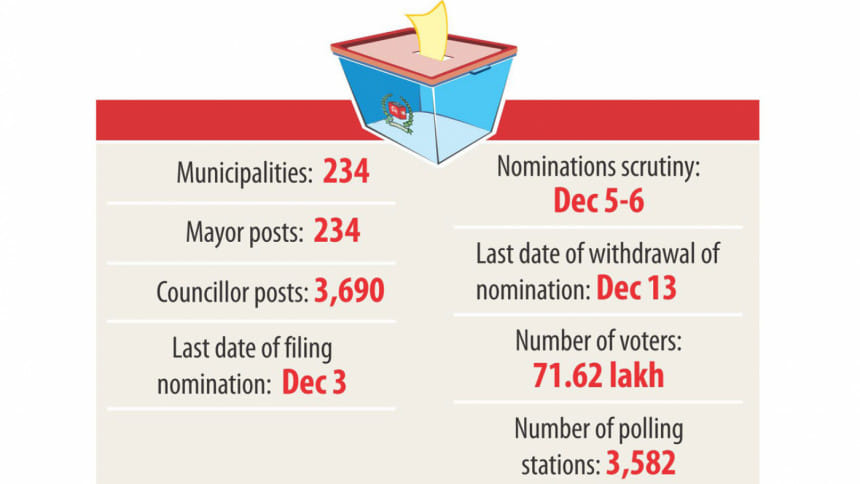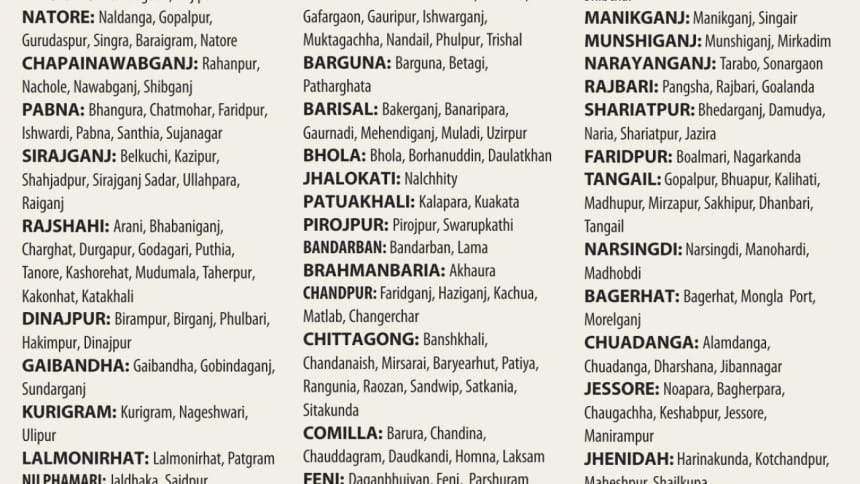Parties battle first time in local bodies

Elections to 234 municipalities will be held on December 30, marking the start of the country's first local government polls on partisan lines.
Announcing the polls schedule yesterday, Chief Election Commissioner Kazi Rakibuddin Ahmad called upon all political parties to participate in the elections by nominating candidates for mayoral posts.
"The more people take part in the election, the more successful it will be. We urge everyone to participate in the polls," he said at a press conference at the EC Secretariat in the capital.
The election is set to generate heat in the country's political landscape, as the two archrivals -- the ruling Awami League and opposition BNP -- will formally enter the battle of ballots along with other parties.
They will pick their grassroots leaders to vie for mayoral posts with the electoral symbols "boat" and "sheaf of paddy."
Both camps are facing problems though those are different in nature. Media reports say the AL may face intra-party rivalries in the polls. It may also have difficulties in choosing a single candidate for each of the mayoral posts.
On the other hand, the BNP high command is worried about the crackdown on the party's grassroots leaders by law enforcement agencies. It has claimed that around 200 party leaders, who are prospective mayoral candidates, have been detained by law enforcers in recent weeks.
Moreover, many grassroots leaders are either on the run to evade arrest or are inactive fearing police action, say a number of BNP leaders.
The party, however, will have an advantage over the AL because of the new electoral code of conduct. BNP Chairperson Khaleda Zia and all her party leaders will be able to participate in election campaigns for party candidates.
But her archrival AL President Sheikh Hasina cannot do so, as she holds the post of PM and enjoys government facilities. Similarly, all her cabinet colleagues and party lawmakers are barred by the code of conduct from carrying out electioneering for party candidates.
As per the electoral code of conduct, the list of individuals enjoying government benefits include the PM, the Speaker, ministers, chief whip, whips, deputy speaker, deputy leader of the House, opposition leader, state ministers, deputy ministers, MPs and mayors of city corporations.
This election will be the first battle of ballots between the two major political parties since the 2008 parliamentary election. The BNP-led alliance boycotted the January 5 parliamentary election in 2014.
In the last municipal elections held between December 2010 and January 2011, the BNP-backed candidates performed better than their opponents supported by the AL. In the polls, BNP-blessed candidates secured 92 mayoral posts while the AL-backed candidates got 88, according to election results of 236 municipalities.
In the 2013 city corporation polls, the BNP-backed candidates won all five mayoral posts in Rajshahi, Khulna, Barisal, Sylhet and Gazipur.
But the BNP-blessed mayoral candidates suffered defeat in the polls to Dhaka and Chittagong city corporations in April this year.
Till now, all local body polls have been held in a non-partisan manner. Political parties lent their support to grassroots leaders but were not allowed to formally nominate candidates or use the parties' electoral symbols.
Political analysts say the December 30 polls may appear to be a challenge for the Rakibuddin-led EC.
The EC has been mired in controversy since the January 5 parliamentary election. And questions were raised about the fairness of subsequent elections to upazila parishads, and Dhaka and Chittagong city corporations.
Talking to reporters yesterday, CEC Rakibuddin said adequate security measures would be taken to ensure free and fair elections this time.
"We will take quick steps to resist any anomalies or irregularities during the polls."
Replying to a question, the CEC said a level playing field would be ensured for all candidates. He urged all to follow the electoral code of conduct during electioneering and the polls.
He also asked the aspirants, who put up posters, billboards and banners on streets, to remove all campaign materials within 48 hours, as none is allowed to start election campaign three weeks before the voting day.
There are 323 municipalities across the country. Of those, 234 will go to polls next month as their tenure will expire by February. Elections to the rest will be held later in phases.
In the polls next month, 234 mayoral posts will be up for grabs for party-nominated candidates, while around 3,700 councillor posts will be contested in a non-partisan manner.
Political parties registered with the EC will be able to nominate candidates only for mayoral posts and use the parties' electoral symbols.
Individuals will be allowed to vie for mayoral posts as independent candidates.
The government had initially planned to hold elections for both mayoral and councillor posts on partisan lines. But later, it backtracked, deciding that only the polls for mayoral posts will be held in a partisan manner.
The EC yesterday said political parties willing to contest the polls need to send applications to the returning officers for the municipalities concerned with the names of party-authorised persons who will pick the candidates. Copies of the applications have to be sent to the EC.
An individual willing to vie for a mayoral post as an independent candidate has to send an application to the returning officer for the municipality concerned.
If the individual has never been elected a mayor, he will have to submit a paper with signatures of 100 voters in his area. However, this won't be necessary if the individual already served as a mayor.
The EC yesterday appointed 234 additional district commissioners, district election officers and upazila nirbahi officers as returning officers for conducting the polls.


 For all latest news, follow The Daily Star's Google News channel.
For all latest news, follow The Daily Star's Google News channel. 



Comments